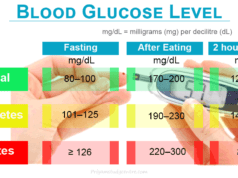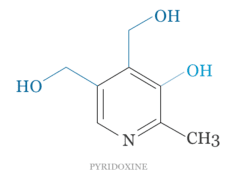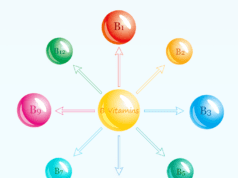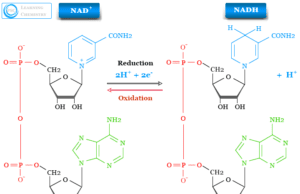Choline Supplement Benefits
Choline is a quaternary ammonium cation that is naturally available in many foods and dietary supplements. The benefits of a dietary choline supplement are similar to those of B vitamins and some vitamins and minerals products. Like other vitamins or minerals, choline is an essential nutrient that is beneficial for our good heart health, brain functions during pregnancy, and neural tube defects. When our diet is deficient in methyl-donor vitamins such as folic acid (folate) and vitamin B12, the requirement of dietary choline rises because it is the primary methyl donor in such conditions. Therefore, Various food sources may increses choline levels in our body while deficiency may cause many health problems. The main dietary sources of choline in people are animal-based food products such as meat, poultry, fish, dairy products, eggs, etc.
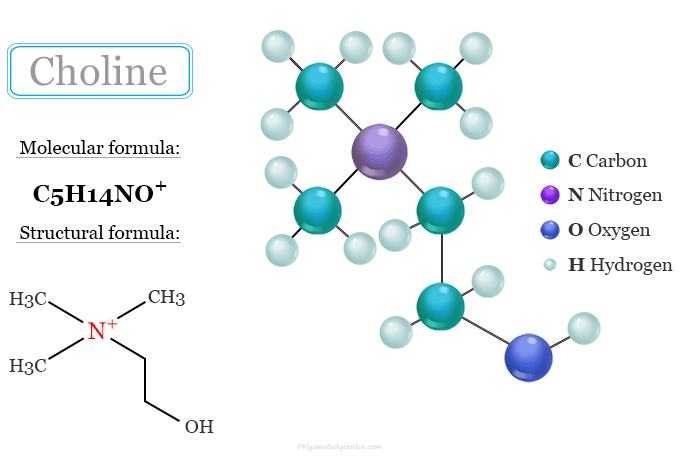
Choline is a water-soluble organic compound that has the chemical formula [(CH3)3NCH2CH2OH]+. It is a component of different phospholipids such as phosphatidylcholines and sphingomyelins. As a component of phospholipids, it is involved in the formation of membrane structure and lipid transport.
Sources of Choline
The human body can produce it endogenously in the liver in the form of phosphatidylcholine but the amount synthesized naturally is not sufficient to meet their daily needs. Therefore, a level of choline must be needed from various food sources to maintain various biological functions in the human body.
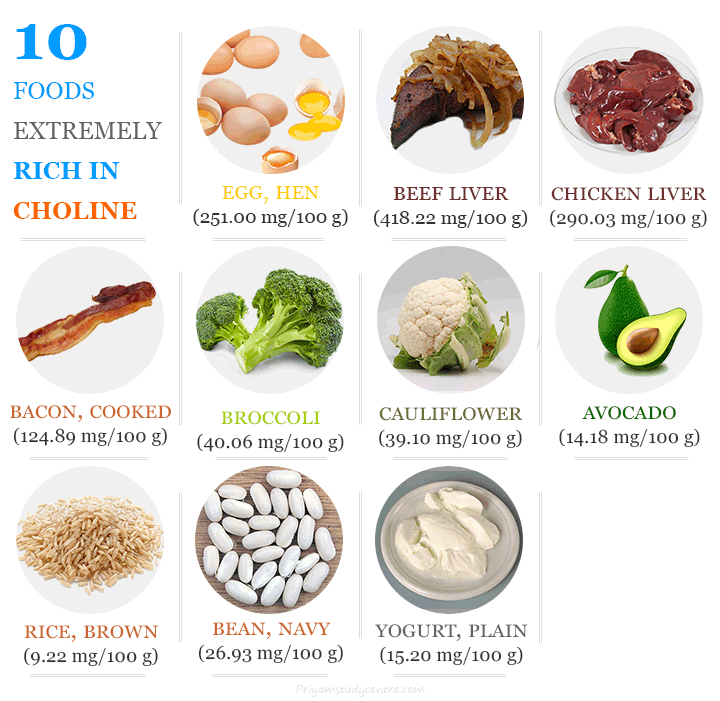
It occurs in foods as a free molecule and in the form of phospholipids or phosphatidylcholine. Human breast milk is rich in choline which provides 120 mg per day for your baby. The choline content of breast milk may increase when a breastfeeding mother intakes a choline supplement in her diet.
Choline Content in Foods
The main dietary sources of choline in the United States peoples are animal-based food products such as meat, poultry, fish, dairy products, and eggs. The other dietary sources of choline may include nuts, seeds, whole grains, cruciferous vegetables, and certain beans.
| Animal-based foods | Plant-based foods | ||
| Meats | Amount (mg/100 g) | Vegetables | Amount (mg/100 g) |
| Bacon, cooked | 124.89 | Bean, snap | 13.46 |
| Beef, trim-cut, cooked | 78.15 | Broccoli | 40.06 |
| Beef liver, pan fried | 418.22 | Cabbage | 15.45 |
| Chicken, roasted, with skin | 65.83 | Carrot | 8.79 |
| Chicken, roasted, without skin | 78.74 | Cauliflower | 39.10 |
| Chicken liver | 290.03 | Cucumber | 5.95 |
| Shrimp, canned | 70.60 | Pea | 27.51 |
| Pork loin cooked | 102.76 | Spinach | 22.08 |
| Eggs & Dairy products (cow) | Grains & Fruits | ||
| Egg, hen | 251.00 | Oat bran, raw | 58.57 |
| Butter, salted | 18.77 | Rice, brown | 9.22 |
| Cheese | 16.50–27.21 | Wheat bran | 74.39 |
| Cottage cheese | 18.42 | Apple | 3.44 |
| Milk, whole/skimmed | 14.29–16.40 | Avocado | 14.18 |
| Yogurt, plain | 15.20 | Banana | 9.76 |
| Sour cream | 20.33 | Orange | 8.38 |
Infant formulas may or may not contain enough choline but in the EU and the US, it is mandatory to provide at least 7 mg per 100 kilocalories (kcal) of every infant formula.
Dietary recommendations
Insufficient data have been available when estimating choline by average requirement (EAR). Therefore, the Food and Nutrition Board (FNB) established adequate intake (AI) levels. The recommended Al for adult men is 550 mg/day and for women is 425 mg/day.
The European Food Safety Authority (EFSA) and the National Academy of Medicine (NAM) recommended milligrams per day (mg/day) for EU countries and the United States. EFSA does not set any upper limits for intake but NAM sets upper limits for intake.
| Choline recommendations (mg/day) | ||||
| Age Groups | EFSA adequate intake | US NAM adequate intake | US NAM tolerable upper intake levels | |
| Infants | 0–6 months | NA | 125 | NA |
| 7–12 months | 160 | 150 | NA | |
| Children | 1–3 years | 140 | 200 | 1000 |
| 4–6 years | 170 | 250 | 1000 | |
| 7–8 years | 250 | 250 | 1000 | |
| 9–10 years | 250 | 375 | 1000 | |
| 11–13 years | 340 | 375 | 1000 | |
| Males | 14 years | 340 | 550 | 3000 |
| 15–18 years | 400 | 550 | 3000 | |
| 19+ years | 400 | 550 | 3500 | |
| Females | 14 years | 340 | 400 | 3000 |
| 15–18 years | 400 | 400 | 3000 | |
| 19+ years | 400 | 425 | 3500 | |
| If pregnant | 480 | 450 | 3500 | |
| If breastfeeding | 520 | 550 | 3500 | |
Excess intake of Choline
A normal dose or high dose of choline may not cause any adverse effects but excessive high doses may be harmful to the human body. A high intake can cause fishy body odor, vomiting, excessive sweating and salivation, low blood pressure (hypotension), and liver toxicity.
Choline consumption has been increasing the production of TMAO, a substance that has been linked to a higher risk of cardiovascular disease in adults.
Functions of Choline
Choline is an essential nutrient that is synthesized in our body and used to maintain various biological functions. The main functions of choline are:
- Cell structure: All plants and animals need choline to preserve the structural integrity of their cells because it helps to synthesize phosphatidylcholine and sphingomyelin. These two phospholipids are major components in maintaining the structural integrity of cell membranes.
- Fat transport and metabolism: It is an important component in lipid transport and metabolism. Therefore, it is a biological component that prevents the accumulation of fat in the liver. It promotes the synthesis of phospholipids and lipoproteins. It also helps in the disposal of triacylglycerols from the liver.
- Nervous system: It is a precursor for the synthesis of acetylcholine which is required for the transmission of nerve impulses. It plays an important part in the early stage of brain development.
- DNA synthesis: It plays an important role in DNA synthesis and modulating gene expression.
- Cell messaging: It may also be important for the formation of various biological compounds that help in cell membrane signaling.
Choline Supplement
Humans can synthesize small amounts of choline by converting the phospholipid and phosphatidylethanolamine to phosphatidylcholine via de novo synthesis. It is not enough to meet our metabolic needs. Therefore, we need to consume choline from our daily foods and a supplement to maintain our good health.
For the best benefits, we need to intake a dietary supplement containing choline only or in combination with B vitamins and in some vitamins and minerals products. Typical amounts in best dietary supplements range from 10 mg to 250 mg in the forms of choline bitartrate, phosphatidylcholine, and lecithin.
Benefits of Choline
It is beneficial for various biological functions of our body. The main health benefits of choline obtained from foods or taking a supplement may include the following:
- Maintain heart health
- Brain development during pregnancy
- Regulating brain function
- Maintains healthy liver function
- Formation of DNA and cell structures
- In Cancer
- Neural Tube Defects
Maintain Heart Health
Choline is a nutrient that may maintain your heart health. Various studies also suggest that it may increase the risk of cardiovascular disease (CVD).
- Homocysteine is an amino acid that enters our body from various protein sources. Along with B vitamin folate can lower homocysteine levels in your blood by converting it to methionine. High homocysteine levels are a risk factor for high blood pressure and stroke. Therefore, it may reduce your blood pressure and decrease the risk of stroke.
- It may also negatively impact your heart. Such biomolecule is converted in our body by gut bacteria into a byproduct called trimethylamine (TMA). It is then converted in your liver to trimethylamine-N-oxide (TMAO) which is a risk factor for cardiovascular disease (CVD).
Regulating Brain Function
It is an essential precursor for the synthesis of the neurotransmitter acetylcholine. Acetylcholine is an important neurotransmitter needed for the synthesis of the two most abundant phospholipids (phosphatidylcholine and sphingomyelin) in the brain.
These neurotransmitters may help nerve cells to communicate with each other. Therefore, acetylcholine is important for regulating memory and mood. Some studies have shown that higher choline intake from foods or from a supplement may benefits on learning and understanding during adulthood and childhood age.
Some studies suggest that low levels of acetylcholine may cause cognitive decline and memory loss including Alzheimer’s disease and senile dementia.
Brain Development During Pregnancy
Choline is not only obtained from our daily diet but also from de novo synthesis. It is an important nutrient for fetal brain development because it influences stem cell proliferation and apoptosis.
During pregnancy, it can influence neural tube closure and lifelong memory and learning functions. A lower intake of this nutrient during pregnancy may raise the risk of neural tube defects in unborn babies. Therefore, pregnant women need more choline to help their babies grow and mental development.
Maintains Healthy Liver Function
Choline is an important factor that is used to transport fat properly from the liver to our body cells. Therefore, it is beneficial for cleaning harmful fats from our liver.
It plays a part in transporting cholesterol and triglycerides from the liver to other parts of our body where they are needed. Some studies suggest that low levels of choline may increase the risk of liver damage or even liver failure.
Formation of DNA and Cell Structures
Choline is an essential nutrient that is involved in the synthesis of phospholipids and other structural components of cell membranes to maintain good health. Therefore, we need sufficient amounts of such biomolecules in our daily diet to preserve the structural integrity of our cells.
It is also involved in a critical step for making DNA that is needed to maintain healthy cells and organ systems of our body.
Choline in Cancer
Disruption of DNA methylation and impaired DNA repair in one-carbon metabolism are thought to be the main causes of carcinogenesis. It may happen due to a deficiency of methyl donors such as folate, choline, betaine, and methionine. Therefore, dietary choline may reduce the risk of some types of cancers.
The deficiency can cause fatty liver disease which increases the risk of cancer. Some studies suggest that higher intakes of choline and betaine may reduce the risk of lung cancer.
Neural Tube Defects
A deficiency may increase the risk of neural tube defects because a higher maternal intake of choline can cause better neurocognition/neurodevelopment in children. A study published in the American Journal of Epidemiology suggests that a high intake of choline and betaine may reduce the risk of neural tube defects (NTD).
Choline and folate can interact with vitamin B12 and act as methyl donors to homocysteine to form methionine. It can then form SAM (S-adenosylmethionine), a substrate that almost controls all methylation reactions in mammals. A study suggested that disturbed methylation via SAM could be responsible for neural tube defects (NTD).
Choline Deficiency
The deficiency in healthy and nonpregnant individuals is very rare because some parts of this nutrient can be synthesized endogenously in healthy humans. In most cases, choline deficiency may be observed due to certain genetic disorders and pregnancy.
The deficiency can cause various health problems such as muscle damage, liver damage, and nonalcoholic fatty liver disease (NAFLD or hepatosteatosis). Recent reports suggest that the metabolism of this nutrient may also play a role in preventing diabetes, cancer, and cystic fibrosis.
Symptoms and Signs
There is no definitive clinical test that can be used to identify persons who are choline deficient but it can be identified by deficiency symptoms and signs. The most common signs and symptoms may include:
- fatty liver disease (FLD)
- low energy levels or fatigue
- cognitive decline
- memory loss and Alzheimer’s disease
- learning disabilities
- mood changes or disorders
- nerve damage
- muscle aches
Simple, rapid, and sensitive ultra-high-performance liquid chromatography–ultraviolet-mass spectrometry (UHPLC-UV-MS) and gas chromatography/isotope dilution mass spectrometry (GC/IDMS) methods are developed for the quantitative determination of choline in liver, plasma, various foods, and brain.
The liquid chromatography/electrospray ionization-isotope dilution mass spectrometry (LC/ESI-IDMS) method is also used for the quantitation of choline, betaine, acetylcholine, glycerophosphocholine, cytidine diphosphocholine, phosphocholine, phosphatidylcholine, and sphingomyelin in the liver, plasma, various foods, and brain.
Frequently Asked Questions
What is Choline?
Choline is a quaternary ammonium cation that is naturally available in many foods and dietary supplements. The benefits of a dietary choline supplement are similar to those of B vitamins and some other vitamins and minerals products.
It is an essential nutrient that is synthesized in our body and used to maintain cell structure and messaging, control our brain and nervous system, fat transport and metabolism, and DNA synthesis. Humans body can produce choline endogenously in the liver in the form of phosphatidylcholine but the amount synthesized naturally is not sufficient to meet their daily needs.
What does Choline Do?
Choline can control our brain and nervous system by regulating memory, mood, muscle, and other functions in the body. It forms the membrane structure that surrounds the cells of our body. It also helps in fat transport and metabolism, DNA synthesis, and cell messaging in our body.
Is Choline Supplement Safe During Pregnancy?
Yes, a choline supplement is safe during pregnancy because it is beneficial for maternal and fetal health. During pregnancy, the demand for it significantly increases because it is required for neural tube formation, brain development, and the synthesis of lipoproteins in your baby.
Getting enough choline during pregnancy can help your baby’s brain and spinal cord development. For best benefits always consult a doctor or healthcare provider before taking a choline supplement because they adjust dosage that is safe for you.
What Foods are Good Sources of Choline?
It occurs in foods as a free molecule and in the form of phospholipids or phosphatidylcholine. The main dietary sources of choline in the United States peoples are animal-based food products such as meat, poultry, fish, dairy products, and eggs. It is also found in many plant-based foods such as nuts, seeds, whole grains, cruciferous vegetables, and certain beans.
Human breast milk is rich in it and provides 120 mg per day for your baby. The choline content of breast milk may increase when a breastfeeding mother intakes more choline in her diet.

